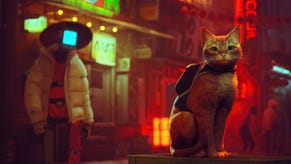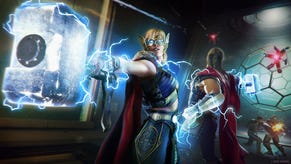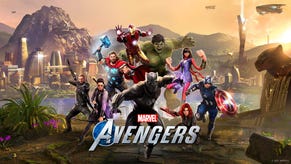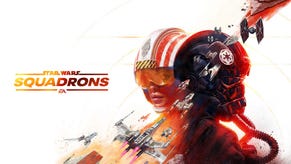It's not Marvel's Avengers' underwhelming looks that'll be its downfall, but its convoluted structure
Crystal Dynamics is taking flak for its reveal of Marvel's Avengers on two fronts.
Its heroes, now instantly recognisable thanks to the success of the Marvel Cinematic Universe, look budget in comparison. Captain United States, Hunk Mash, Storm Lord, and Ginger Lass wouldn't look out of place in Poundland, and yet here they are cluttering up the screen.
The other problem is that the gameplay we've seen so far looked decidedly un-superheroic. Thor, Captain America, Iron Man and Black Widow punch mercenaries in San Francisco, throwing soldiers around one-on-one like Hulk couldn't just swat them all away with a single hand in an instant. It's the Superman problem. How do you play as someone who can do anything?
Behind closed doors at E3 I sat down to watch more gameplay, and it only drilled down on the same problems in detail. Earth's Mightiest Heroes are trudging along the Golden Gate Bridge, with a punch and a kick. The entire campaign is single-player - not necessarily a bad thing - but probably a missed opportunity when the point of the Avengers is that they assemble - the team-up and interplay between the characters. You don't get to choose who you play as at any point during the campaign. This mission is for Hulk, the next for Tony Stark. A boss fight against c-list supervillain Taskmaster includes Black Widow and quick time events. In 2019.
It's underwhelming when we've watched 22 movies and read countless comic book stories of the Avengers battling cosmic armies on a universal scale, a team of superheroes living, fighting and pulling together to drag humanity through the threat of annihilation. But then Crystal Dynamics isn't making a MCU or comic book game. It remains to be seen how the single-player story develops, but if it's just that same third-person brawl with mercs replaced by Skrull or frost giants, Marvel Ultimate Alliance 3 is out much sooner, thanks.
But there's a third issue that bothers me more. The convoluted structure of the game, its multiplayer, how it's going to release future DLC and sell you new skins. It's not a problem limited to Marvel's Avengers, but this is another game that ties itself in knots in an effort to give the player more after release and yet still have something to sell to make it financially viable in the longer term.
Here's how Noah Hughes, studio creative director, tried to explain the structure of Marvel's Avengers to me verbatim when I sat down with him last week.
VG247: We've just seen a glimpse of the campaign. But then what comes next after that? Is the campaign single-player or is that four player co-op?
Noah Hughes: Yeah, I think this is probably the most important point of clarity, because it's hard in any one asset to highlight the multi-facets of this game. The experience at A-Day that is featured in the demo is a little atypical in the sense that it prescribes sequences for each hero. So through the course of it you'll be introduced to Iron Man, get to experience some of his abilities, and go through all the five core Avengers that we're talking about today. And that's a bit atypical in the sense that our campaign will feature levels that are designed to heroes, but you'll often experience those as longer periods of time. So where we see Hulk, a good five minutes of Hulk smashing in the demo, in the campaign you may play a full level that's featuring Hulk, and you'll be able to go through more of his abilities and even be trained, master it as a player and be tested with those skills. So you see Abomination glimpsed in the trailer, that'd be an example of, after I've got my legs under me with Hulk I'm starting to master some of those abilities, now we have an experience where we have to prove that. And that's what you might expect from a Crystal Dynamics narrative-driven campaign.
But in an action-adventure sense, as you know, often times the missions that open up throughout the campaign, aren't critical to finishing that final objective. So you can sort of beeline through the story, fight that big fight, but there's also a vast array of missions that we feel, the Avengers really protect the world from threats, and part of what we've built through the campaign is an introduction to multiple regions and multiple threats. And that the hope is the players are able to choose what heroes they want to take on some of these missions, and also team up with other players. So there's any number of missions along the campaign where it's not prescribed what hero you're playing. You say, "Hulk's my favourite, I'm going to play him on a lot of my side missions," or jumping in online, that we match you with people to help you accomplish these campaign missions as well. And that's how multiplayer co-op integrates into the campaign, is it allows for single player hero specific missions, and then an opening up of optional missions that you can play in any way you like.
VG247: So the single-player campaign is for one person to play through with multiple characters, then all the side quests are for co-op. For four player co-op?
Noah Hughes: If you want, if you want. You can actually play them single player but you at least can choose what hero you want to focus on, right? So you get more choice in those additional missions, and the central campaign leans a little bit more heavily on really introducing you to each hero as you go along and mastering those abilities. And then the campaign as a whole is really designed as an on-ramp into a world of replayable experiences. So you then have unlocked all these heroes, you've levelled them up to some extent, but now you've got new things to do in that post-game experience that will ask you to level up even more, and team up with your friends to take on those threats. So co-op kind of gets layered in, in those optional missions, and then becomes the superhero experience that you just become part of at the end of that campaign.
VG247: Okay. So after the campaign, is it more of an open-world environment? Or is it a hub world?
Noah Hughes: In the sense that open world is often more of a contiguous location, we've created the sense that the Avengers have a base of operations and global threats. So you'll be choosing from missions around the globe, and part of our post-launch plans are to introduce new regions and new heroes. And that's all of course no additional cost, that we really want players to see this game as an on-ramp into that world, and then look forward to coming back for some of those new experiences. I'll add one more - hopefully I haven't lost you yet, because there's one other piece to the multiplayer, which is after you've played that first introductory mission, you can jump straight into post-game multiplayer, and that's spoiler-y. So if you want to play the campaign without spoilers, you should play the multiplayer along the way as part of the campaign. But we recognise that some people might just be playing this to play with their friends. You come in, you learn about the world through A-Day, and then, boom, you can play anything you want and play any hero you want.
VG247: And then you say all the additional content after that is going to be free? So presumably, extra maps and characters, but not skins to customise them?
Noah Hughes: The things we're focusing on now, there are, you can purchase customisation elements. So our commitment is that there's no randomisation in the loot box. There's no pay to win, so you're not buying gameplay progression. So within that we recognise that part of customising your heroes is earned elements, both skills, gear, and in some cases, unlocked outfits from your story experiences. But then also you can purchase additional outfits. But it's important to us that that is optional to the players, and part of what we're doing is through playing the game you're actually able to customise and refine the roster of heroes to your liking.
VG247: Yes. But then you could also buy a different Iron Man suit for example.
Noah Hughes: Exactly.
So in short, you buy the game and play through the single-player campaign. This opens up multiplayer side quests that you can then play with up to three other players. Once the campaign is over you can go back and play these side quests again and again, and future DLC will also be in a similar vein to the side quests, with four players taking on different heroes. You can also buy new costumes with real money, as well as earn some in-game. (Incidentally, this is why we edit our conversations with developers down).
I can see a reason to be cagey about the structure so there's no spoilers, but it seems almost as if Crystal Dynamics is embarrassed that the multiplayer of Marvel's Avengers is relegated to side-quests. Maybe it's because side-quest are not the main focus, and previous rumours had suggested this game would be a Destiny-style co-op team-up. Hughes's explanation suggests Marvel's Avengers isn't really what we're used to with games as a service, and more like a traditional single-player game with some co-op multiplayer on the side. There's no PvP in Marvel's Avengers, and let's not forget the original deal between Crystal Dynamics and Marvel was for multiple titles, so creating one game that lasts for five years or more doesn't make sense to the business suits.
First officially announced in January 2017, that would suggest work on it began the previous year (most likely after Rise of the Tomb Raider shipped in November 2015, as Eidos Montreal did the bulk of work on Shadow of the Tomb Raider). Has the game gone through a number of different iterations that have left it trying to be all things to all people? This is a question we've asked before about Anthem, Street Fighter 5, Destiny and Fallout 76, and more - games that arrive and appear to be trying to do too many things, or lack promised features at launch, or grant different levels of access to players depending on how much they spend. What's wrong with focusing on one thing and doing it really well?
It's this splintering of a game, this lack of cohesion, the convoluted roundabout way of structuring and selling games and getting across the message of what it is, what you do, that all too often gets in the way of sitting down and actually playing the damn thing. This p**s-poor communication that contributes to the anti-hype, the deflation on release and realisation that you're not playing the thing you thought you were buying, that you have to wait for things you expected on day one.
Sure, if you were to come to the 22 MCU movies blind today you'd have trouble figuring out which one to watch first. Crystal Dynamics' Marvel's Avengers appears bloated and confused from the get-go.
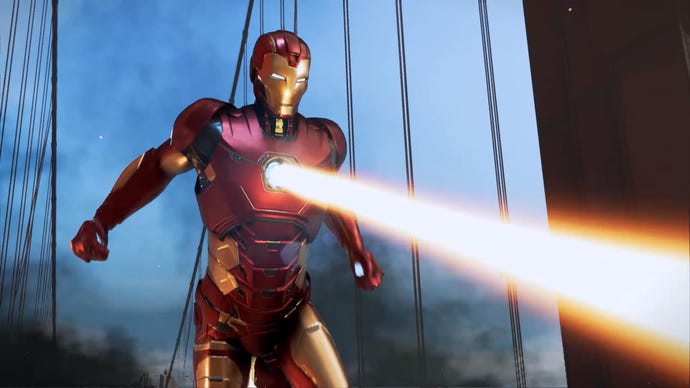





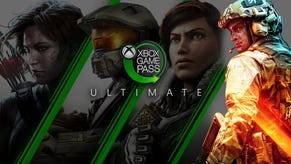
.png?width=291&height=164&fit=crop&quality=80&format=jpg&auto=webp)
